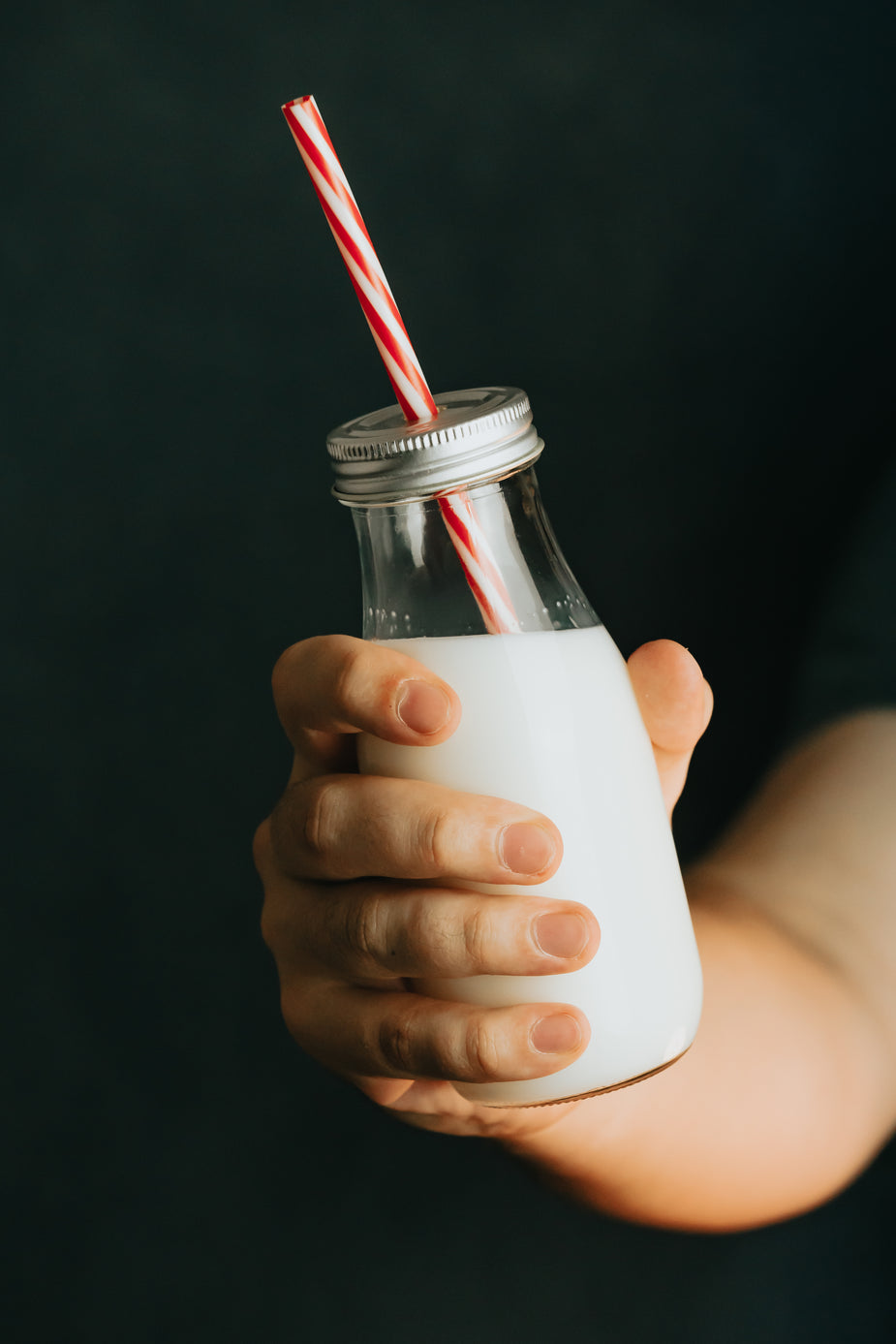Last Updated on November 9, 2023 by Fasting Planet
Milk is rich in calcium, cobalamin, phosphorus, riboflavin, and vitamin B12. You probably drink milk often, whether it’s straight from the carton or in a bowl of cereal. As a vegan, is milk still allowable on your diet?
Vegans cannot drink dairy milk, but they can consume plenty of plant-based milk instead. These include nut, oat, hemp, sunflower, banana, flax, and coconut milks.
In this article, we’ll explain further why vegans avoid dairy milk. Then we’ll take a deep dive into 10 different types of vegan milk. You’ll learn more about the flavor of each plant-based milk as well as its nutritional profile. Keep reading!
Why Vegans Don’t Drink Dairy Milk
The reason vegans eschew dairy milk is the same as why they’ll skip full-dairy cheese, yogurt, butter, and ice cream. These foods are all animal byproducts since they come from cow’s milk. As we wrote about in another recent blog post, cows are often treated cruelly for their milk.
The young female cows are impregnated as soon as they’re physically able to stand it, becoming pregnant over and over again. The other health needs of the cow are ignored, as some farmers care more about producing milk than anything else.
All this strain on the female cow’s body means she’ll live for about five years when she could have had a life at least twice as long as that. It’s truly heartbreaking!
Dairy-Free Vegan Milk Varieties to Try Today
Dairy milk is probably a big part of your life, or it was before you went vegan. You never drink your coffee without a splash of milk and you couldn’t imagine munching on dry cereal. You also use milk in so many recipes, from cheesy omelets to pancakes and desserts. What will you replace dairy milk with as a vegan?
You have no shortage of options, actually! The following plant-based milks are all safe for vegans to consume. You’ll forget all about dairy milk once you start exploring these lower-calorie, delicious alternatives.
Hazelnut Milk
Although Nutella is not vegan (due to an animal byproduct), you can still enjoy pure hazelnutty goodness in a nice, tall glass of hazelnut milk. The first time you pour yourself some of this nut milk, you’ll wonder if you accidentally picked up a chocolate flavor at the grocery store.
Don’t worry, you didn’t. Hazelnut milk has a natural brown color akin to chocolate milk even if it does not share a chocolate flavor. You do have to be a hazelnut fan to drink this milk, as the taste of hazelnut comes through loud and clear (some plant-based milks have a much subtler flavor).
In a cup of hazelnut milk, you’re getting:
- 110 calories
- 7 grams of total fat (6 percent of your daily recommended value)
- 109 grams of carbohydrates (6 percent of your daily recommended value)
- 7 grams of dietary fiber (3 percent of your daily recommended value)
- 14 grams of sugar
- 2 grams of protein
- 1 percent calcium
- 2 percent iron
Oat Milk
Water plus rolled oats make oat milk. Yes, it’s really that simple. Oat milk has a somewhat thick texture, even more so than cow’s milk, but the taste is more akin to that. Still, the depth of flavor is sweet but not overpowering. If you’re looking for vegan milk to use instead of dairy milk in your recipes, oat milk is it.
Per one-cup serving, here are the nutrition facts for oat milk:
- 130 calories
- 15 grams of carbs
- 5 grams of fat
- 2 grams of dietary fiber
- 4 grams of protein
- 25 percent vitamin D
- 35 percent calcium
Peanut Milk
You may snack on peanuts by the handful, but when they’re added to dairy-free milk, the nut takes on a different flavor profile. Peanut milk has been described as everything from tasting grassy to having a “biting” flavor. You’ll notice some hints of peanutty taste in this milk, but not as much as you’d expect.
In a serving of 8 fluid ounces, the purply peanut milk contains:
- 130 calories
- 3 grams of total fat (4 percent of your recommended daily value)
- 110 milligrams of sodium (5 percent of your daily recommended value)
- 18 grams of carbs (7 percent of your daily recommended value)
- 1 gram of dietary fiber (4 percent of your daily recommended value)
- 13 grams of sugar
- 8 grams of protein
- 2 percent calcium
- 6 percent potassium
Hemp Milk
Referred to sometimes as hemp seed milk, hemp milk also has a simple recipe, just water and ground hemp seeds. To make hemp milk taste more appealing to vegans, it’s often sweetened. Its flavor, texture, and color are otherwise very hemp-like, meaning hemp milk has a nutty taste and a consistency that’s creamy like dairy milk.
In a one-cup serving, here’s what you’re ingesting by drinking hemp milk:
- 130 calories
- 4 grams of protein
- 3 grams of fat
- 20 grams of carbs
- 1 gram of dietary fiber
- 15 grams of sugar
Sunflower Milk
If you love looking at sunflowers as part of your garden, wait until you try milk from this sunny yellow flower! Okay, so technically sunflower milk is sourced from the seeds, not the petals, but the earthiness of this vegan milk is part of its charm. Vanilla or other sweeteners make each sip more pleasant.
In a 16-fluid ounce serving, sunflower milk contains:
- 4 calories
- 5 grams of total fat
- 6 milligrams of sodium (12 percent of your daily recommended value)
- 9 grams of carbs
- 1 grams of sugar
- 1 grams of dietary fiber (29 percent of your daily recommended value)
- 2 grams of protein
- 1 percent vitamin A
- 45 percent vitamin B6
- 11 percent vitamin C
- 62 percent vitamin E
- 1 percent vitamin K
- 12 percent calcium
- 36 percent iron
- 51 percent magnesium
Banana Milk
As a vegan, you already use bananas as a replacement for a lot, including eggs. Why not sub out dairy for bananas as well? Banana milk is just bananas and water, so it has a natural banana taste and creamy texture and consistency. The pastel yellow color is also super cute!
A cup of banana milk contains:
- 150 calories
- 2 grams of total fat (3 percent of your daily recommended value)
- 10 milligrams of cholesterol (3 percent of your daily recommended value)
- 110 milligrams of sodium (5 percent of your daily recommended value)
- 25 grams of carbs (9 percent of your daily recommended value)
- Under 1 gram of dietary fiber (3 percent of your daily recommended value)
- 23 grams of sugar
- 7 grams of protein (12 percent of your daily recommended value)
- 20 percent vitamin D
- 20 percent calcium
- 15 percent potassium
- 15 percent vitamin A
- 30 percent riboflavin
- 40 percent vitamin B12
- 25 percent phosphorous
Pea Protein Milk
When green split and yellow peas are made into a powder and their protein sources extracted, you get pea protein. This powder is then added to plant-based, dairy-free milk. Don’t worry, pea protein milk doesn’t taste a thing like peas. Some varieties of this milk are flavored like chocolate or vanilla.
Here are the nutrition facts for a cup of pea protein milk:
- 70 calories
- 5 grams of total fat
- 8 grams of protein
- 15 percent iron
- 30 percent vitamin D
- 10 percent vitamin A
- 45 percent calcium
- 13 percent potassium
Macadamia Milk
You probably only munch on a few macadamia nuts at a time since their buttery flavor is so rich. Macadamia milk feels like an equally luxurious treat, as this milk has a smoothness and thickness that makes it perfect for whipping up your own vegan milkshakes at home. It even has flavor notes of fruitiness, surprisingly!
A serving of macadamia milk that’s 8 fluid ounces is loaded with:
- 70 calories
- 5 grams of total fat (8 percent of your daily recommended value)
- 105 milligrams of sodium (4 percent of your daily recommended value)
- 7 grams of carbs (2 percent of your daily recommended value)
- 1 gram of dietary fiber (4 percent of your daily recommended value)
- 6 grams of sugar
- 1 gram of protein
- 10 percent vitamin A
- 45 percent calcium
- 2 percent iron
Almond Milk
Of all the non-dairy vegan milk varieties, almond milk remains the most popular. That’s likely because it has such a universally-accepted taste, at least for milk standards. It’s somewhat nutty but not very noticeably so, a little bit sweet, but overall, very much like dairy milk.
Although some vegans complain that almond milk doesn’t get very cold even if you refrigerate it, that’s a small price to pay for fewer than 40 calories per cup. To remind you, cow’s milk has more than 100 calories in the same serving size.
A cup’s worth of unsweetened almond milk contains:
- 30 calories
- 5 grams of total fat (4 percent of your daily recommended value)
- 170 milligrams of sodium (7 percent of your daily recommended value)
- 1 gram of carbs
- Under 1 gram of dietary fiber (4 percent of your daily recommended value)
- 1 gram of protein
- 10 percent vitamin A
- 45 percent calcium
- 4 percent iron
- 25 percent vitamin D
- 50 percent vitamin E
- 2 percent riboflavin
- 2 percent copper
- 4 percent manganese
Soy Milk
Soy is a major staple of the vegan diet, including tofu, soy protein, and soy flour. Why not add soy milk to that list? This plant-based milk is flavored so it tastes nothing like a slab of tofu. Some varieties available include saffron, almond, masala, cardamom, chocolate, and vanilla.
In a cup of soy milk, you’re consuming:
- 131 calories
- 3 grams of total fat (6 percent of your daily recommended value)
- 124 milligrams of sodium (5 percent of your daily recommended value)
- 15 grams of carbs (5 percent of your daily recommended value)
- 5 grams of dietary fiber (6 percent of your daily recommended value)
- 10 grams of sugar
- 8 grams of protein (16 percent of your daily recommended value)
- 6 percent calcium
- 8 percent iron
- 10 percent vitamin B6
- 15 percent magnesium
Conclusion
With so many delicious, creamy, non-dairy plant-based milks available for vegans to enjoy, you’ll never want to drink cow’s milk again. Each time you choose vegan-friendly milk, you reduce the need for cow’s milk little by little, possibly saving the lives of cows!

